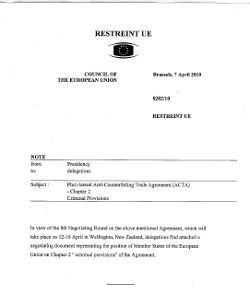Paris, June 23rd 2010 – A document leaked from the Presidency of the EU reveals that Member States are pushing for new criminal sanctions into the Anti-Counterfeiting Trade Agreement (ACTA), a few days ahead of the next negotiation round. The proposal stated in this document reveals how illegitimate and dangerous the whole ACTA process is, while exposing the scary position of the EU calling for more repression of non-for-profit usages… and their incitation.
The ninth round of negotiations1From June 28th to July 2nd of ACTA will begin in a few days in Luzern, Switzerland. A new leaked text, dated April 7th, proves that Member States, through the Presidency of the Council of the European Union, are negotiating the toughest parts of ACTA. The fact that the Presidency is negotiating along with the Commission 2While the Commission is the official negotiator for the EU, it can only negotiate trade related issues. As criminal sanctions are in the competency of Member States, they are therefore negotiated by the Council represented by the Presidency. by itself shows that ACTA goes way beyond the scope of a regular trade agreement. Criminal sanctions (jail sentences!) being negotiated and not debated by elected representatives in democratic arenas, is more than shocking. Such a blatant denial of democracy justifies by itself a rejection of the whole ACTA process, whatever the agreed text might be.
But the content of the position pushed by the Member States of the EU is even more disturbing. The Presidency document states that “The Position of the Member States of the European Union is still under examination” with regard to article 2.14.1 that covers copyright or related rights infringements. As visible in the released ACTA text, some proposals for 2.14.1 explicitly plan to apply criminal sanctions to “infringements that have no direct or indirect motivation of financial gain”, and others give a definition of financial gain that include obtaining anything without paying3footnote 37 of the released ACTA text explicitly says “For purposes of this Section, financial gain includes the receipt or expectation of receipt of anything of value.” meaning that for instance any exchange of information can fall under the scope of sanctions.. The EU is clearly pushing for new criminal sanctions on counterfeiting and copyright infrigement that will also target non-commercial usages. If criminal sanctions for non-for-profit transfers of data is included in the final version of article 2.14.1, criminal sanctions for “inciting, aiding and abetting” will automatically apply4pages3: “the provisions of this section shall apply to inciting, aiding and abetting the offences referred to in Article 2.14.”.. Consequences for freedom of expression and innovation on the Internet could be devastating.
“The ACTA agreement, by its opacity and undemocratic nature, allows criminal sanctions to be simply negotiated. The leaked document shows that the EU Member States are willing to impose prison sanctions for non-commercial usages of copyrighted works on the Internet as well as for ‘inciting and aiding’, a notion so broad that it could cover any Internet service or speech questioning copyright policies. EU citizens should interrogate their governments about their support to policies that obviously attack freedom of speech, privacy and innovation. Around the next round of negotiations and beyond, ACTA should be restlessly combatted and opposed worldwide.” concludes Jérémie Zimmermann, spokesperson for citizen advocacy group La Quadrature du Net.
References


